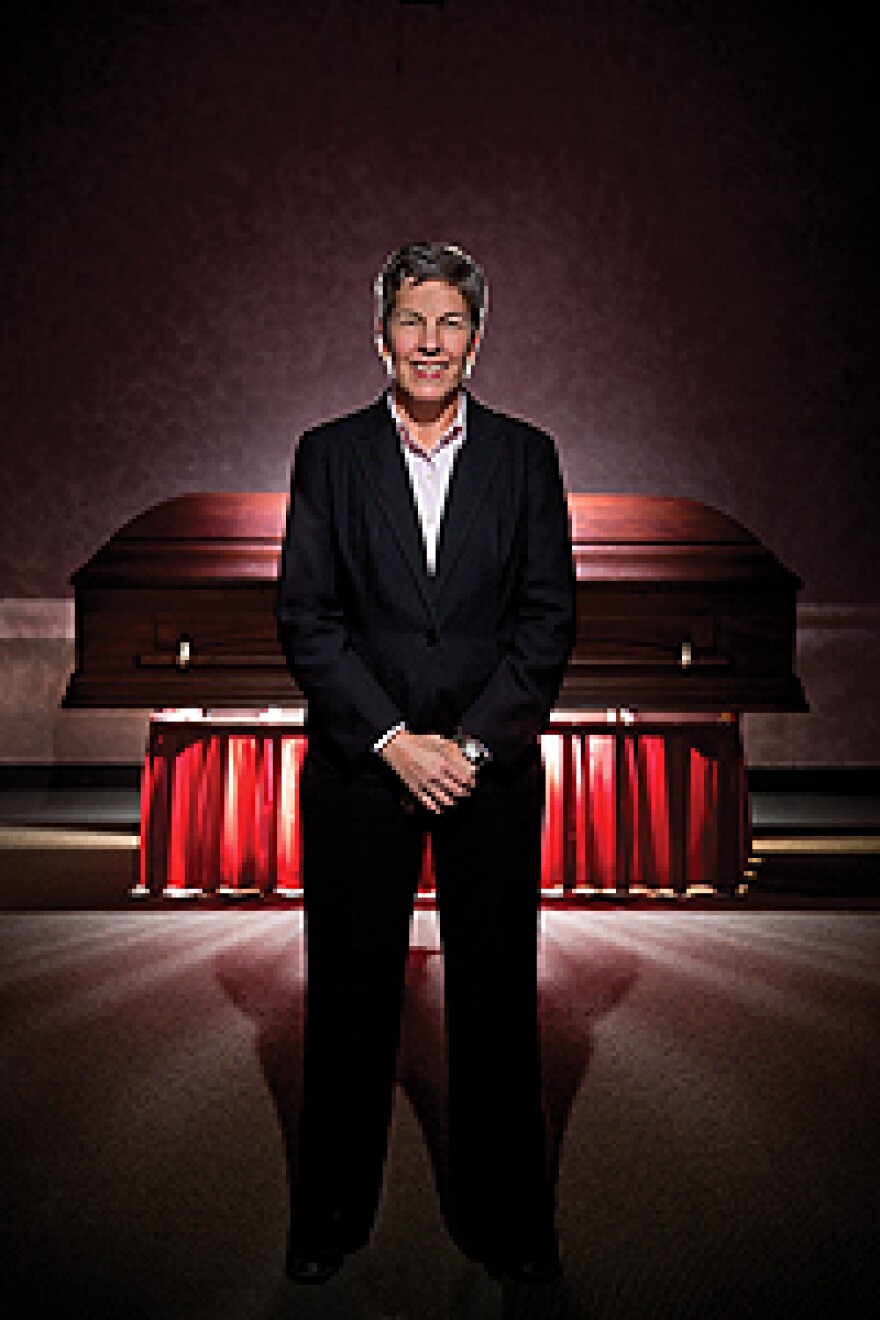“Some people probably think, ‘Ugh, you work with dead people?’ But for me it’s an honor.”
Laura Sussman, Kraft-Sussman Funeral Services
Desert Companion: Is being a funeral director something you ever saw yourself doing?
Laura Sussman: No, I never saw myself doing this. Actually, when I was a child our neighbor was a mortician and it was very scary for me. I never talked to him about what he did or anything. He was sort of an anomaly. This was a working-class neighborhood, so nobody went to work in a suit except him. He had the typical look: tall, thin, long face, dark suit. He was a nice guy, but I knew he worked with, you know — at a funeral home. It was just so foreign to me. I went to Ohio State, got my master’s in education and was in nonprofits for 30 years. I never dreamed I would be doing this, but my partner, Wendy, helped start something called the chevra kadisha within the conservative Jewish movement here. That’s a group from the synagogue that would go in and care for a Jewish person when they pass away and prepare them for burial. I grew very sensitive to the whole process of how people are cared for when they have a loved one who passes away, by going into different mortuaries, seeing the process, and hearing from families that weren’t necessarily happy with the services they were given. Most of the funeral homes in Las Vegas are big corporate chains. It’s a lot of pressure; there are a lot of commission sales people that try to push things.
DC: I was surprised to learn that many funeral homes are part of publicly traded corporations. Is there a funeral-industrial complex?
LS: There is. We just felt there needed to be another way — back to the way it used to be. … So we decided to open up a funeral home, which is sort of unheard of. Most people don’t just wake up and say, “Okay, let’s open a funeral home!”
DC: Are there certain “rookie mistakes” in this line of work?
LS: This is a really silly thing, but one of the hardest things for me is that I get lost in the hospitals. I still have to call someone to go with me because it’s like a maze. I don’t want to be disrespectful and take someone who’s passed away through the main areas, and in the back of the house you have to know where you’re going. I know it’s a silly thing, but it’s my biggest challenge.
DC: Death, so I’m told, waits for no one. Does that make it a 24/7 job?
LS: I didn’t think about that when we decided, “Let’s do this!” Most of my friends were starting to retire. It is 24/7, and the first couple years we didn’t have an answering service; we didn’t even have any staff. We took every call. It could be four in the morning and we would go out and bring the person into our care. We could sit for maybe two weeks with no calls and then be working around the clock for days.
DC: Is it difficult finding good help?
LS: We looked for a long time … That said, every week people come in seeing if they can work for us. There are a lot of people, which I never realized, who always wanted to work in this industry.
DC: Are any of the people who show up kind of strange?
LS: Oh, yeah. Oh my gosh, we’ve had some really weird people. They scare us! I can’t imagine how a family would feel. So … yeah …
DC: Do you ever get the creeps, aside from certain job-seekers?
LS: No. My friends ask me that. My friends get the creeps. They’ve become more sensitive to what we do, but at first even the UPS guy wouldn’t even walk in the door. And we tried to create something that’s not a typical funeral home, something that’s a little more welcoming and comfortable, like any professional office environment. We don’t use a hearse, we use an Escalade, things like that. We don’t dress in suits except for services. We want people to feel comfortable.
DC: What happens at cocktail parties when someone asks what you do for a living?
LS: It’s a real conversation-stopper. Sometimes people are intrigued, but often it’s like, “Oooh … thank you,” and walk away.
DC: Do they assume you’re morbid?
LS: They don’t really tell us. They just sort of leave. … You know, I was in India last year and one of the things I wanted to do was explore the Hindu death culture. In India, the lowest, lowest-caste are the people that take care of the cremations, the ones who keep the fires going and bring the wood. And I sort of wonder if people here look at funeral people as a low-caste. I feel like it’s such a wonderful gift to be able to do this, but I’ve never really thought about what other people think. I imagine some people probably think, “Ugh, you work with dead people?” But for me it’s an honor. When a family comes to us and says, will you care for our loved one, it’s like, “Wow, thank you for giving us the honor of doing that.”
DC: Is there something you’ve learned through this work that has changed the way you look at the world?
LS: The fact that everybody has a story. I’ve really learned to listen a lot more than I used to. That’s part of our job, to listen. Everyone’s got something that makes them special. It makes me appreciate life more, and appreciate my family and my friends. I call my kids a lot.
DC: Okay, maybe I’m the morbid one, but do you ever find yourself walking around thinking, you know, that person would make a really attractive corpse?
LS: Never!



